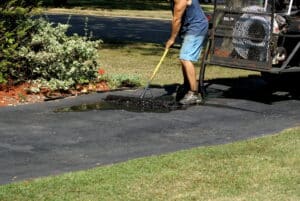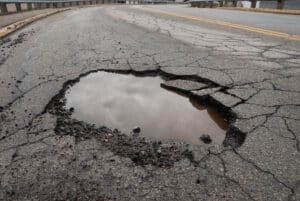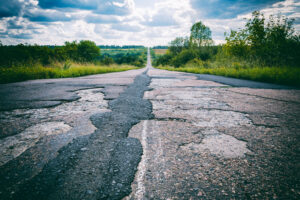Asphalt driveways are a durable and worthwhile addition to any property, but over time, they can develop cracks, potholes, and surface wear. Fixing these issues quickly improves the safety, durability, and visual appeal of your driveway. In this guide, we will explore common types of damage and go over some DIY methods on how to fix them effectively.
Understanding Asphalt Driveway Damage
Asphalt driveways are built to last, but weather conditions, heavy traffic, and aging can cause worrisome damage. Luckily, recognizing the damage early means a more straightforward repair process. Here are the most common driveway imperfections:
- Cracks: Cracks are the most common forms of asphalt damage. They can come in many forms, such as transverse, longitudinal, or block cracking. Often, the cracks start small and widen over time if ignored. Cracks can be caused by a variety of factors, including the natural aging of the material, shifting ground underneath the driveway, or even the weight of vehicles passing over the surface.
- Potholes: Potholes develop when cracks in the asphalt allow water to seep into the underlying layers, eroding the base and weakening the surface. Potholes are hazardous because they can quickly morph into deep depressions that damage vehicles and pose a threat to pedestrians. Preventing potholes can save a lot of time, effort, and headaches.
- Surface Wear and Raveling: Over time, the surface of your asphalt driveway may begin to break down, resulting in a rough and uneven texture. This can be caused by weather conditions or the natural wear from vehicles. Raveling happens when the aggregate and binder in the asphalt start to separate, leading to an uneven, pitted surface.
- Drainage Problems: Poor drainage can worsen all other types of asphalt damage. Water should be allowed to flow smoothly into a drain from your pavement. Water that accumulates on the surface or around the edges of the driveway can seep into the asphalt, causing cracks and potholes to form more quickly. Drainage problems may also lead to standing water, which can freeze in the winter and exacerbate the damage.
Recognizing these types of damage early is key for extending the lifespan of your driveway and keeping it healthy.
How to Fix These Common Asphalt Driveway Issues
Now that we’ve covered the different types of damage, let’s walk through how to fix them. Some driveway issues require professionals, but many asphalt driveway repairs can be done as DIY projects with the right tools and materials.
Fixing Cracks
For smaller cracks, you can use an asphalt crack filler or sealant. Here’s a simple step-by-step guide for repairing cracks:
- Step 1: Clean the crack with a wire brush or pressure washer to remove debris.
- Step 2: Fill the crack with an asphalt crack filler using a caulking gun.
- Step 3: Smooth the surface with a putty knife and allow it to dry, following the product instructions.
For wider cracks, you may need to use a patching compound to fill the large gap. The application process is similar.
Fixing Potholes
Potholes can be a bit pricey to repair, but it depends on the size and severity. Smaller potholes are pretty tricky to repair, but manageable with a DIY approach. Here’s how to fill a pothole yourself:
- Step 1: Clear out debris from the hole using a shovel or broom.
- Step 2: Fill the hole with a patching mix. Keep an eye on its level and make sure it’s slightly higher than the surrounding surface.
- Step 3: Compact the material and smooth the surface with a trowel. Let it dry before using the driveway.
If the damage is especially rough or you want a more permanent and durable solution, hot asphalt is the way to go, although it usually requires a professional’s help.
Surface Wear and Raveling
If your asphalt surface is showing signs of wear or raveling, you can restore its appearance with an asphalt resurfacing treatment:
- Step 1: Clean the driveway with a pressure washer to remove dirt, debris, and oil stains.
- Step 2: Apply an asphalt resurfacer with an even coat using a long-handled squeegee.
- Step 3: Allow the resurfacer to dry completely, typically 24 to 48 hours.
Addressing Drainage Issues
Proper drainage is essential for preventing water from damaging your driveway. Here are some methods for improving the flow of rainwater:
- Step 1: Inspect areas for standing water.
- Step 2: Clean gutters and drains to allow proper water flow.
- Step 3: Consider installing additional drainage solutions, like French drains or pipes, to redirect water away from the driveway.
You may wonder if it is worth it to try to fix these issues yourself or if you should hire a professional.
Should You Call a Professional to Fix Your Driveway?
While many asphalt repairs can be done by homeowners, some issues may require a professional’s expertise. If the damage to your driveway is widespread, involves deep structural issues, or requires specialized equipment (such as a hot asphalt mix), it may be best to call in a professional.
Professional work will likely keep repairs long-lasting. For example, if you need to resurface a large section of your driveway or repair multiple potholes, a professional will guarantee that the new layer of asphalt is evenly applied and properly compacted, reducing the risk of future damage.
Also, professionals can assess the condition of your driveway’s underlying structure. If your driveway has severe drainage problems or subsurface damage, a professional can point out these issues and address them before they worsen.
In short, while small DIY repairs are doable in many cases, professionals should be consulted if there is extensive damage or if specialized tools are required.
How to Prevent Asphalt Driveway Damage
Preventing damage to your asphalt driveway is key to maintaining its durability and appearance. Here are a few maintenance tips to keep your driveway in top shape:
- Sealcoat Regularly: Applying a sealant every 3-5 years can help protect your driveway from UV rays, water damage, and oil spills. Sealcoating acts as a protective layer over the asphalt that can also prevent cracks from forming.
- Clean Your Driveway: Regularly cleaning your driveway helps remove debris and contaminants that can cause long-term damage. Pressure washing or using a broom regularly to clear leaves and dirt helps keep your driveway in good shape.
- Fix Minor Issues Quickly: Small cracks or chips can quickly escalate into larger issues if not addressed promptly. Keep an eye out for any early signs of damage and take action before they become major problems.
- Control Water Flow: Make sure your drainage systems are working properly to prevent water from infiltrating the asphalt. Clean your gutters and drains regularly and install additional drainage solutions if necessary.
- Limit Heavy Vehicle Traffic: Excessive weight from heavy vehicles can damage the surface of your driveway. Limiting the use of heavy trucks or equipment on your driveway will extend its lifespan.
By following these 5 simple tips, you can avoid costly repairs and keep your driveway looking its best for years to come.
Superior Asphalt Can Help You Fix Your Asphalt Driveway
Repairing an asphalt driveway doesn’t have to result in a headache. By identifying damage early and using the proper tools and techniques, you can restore your driveway to look brand new. Setting up regular maintenance and inspections should also be top of mind for anyone with an asphalt driveway. At Superior Asphalt, we take pride in providing top-notch materials and asphalt maintenance services, ensuring the longevity of your pavement. Get in touch with us for a property-specific quote today!




